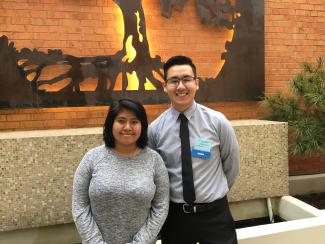By: Dr. Andrew Yox, NTCC Honors Director
For the second year in a row, NTCC sophomore Presidential Scholars comprised their own panel at a professional scholarly meeting. At the annual fall gathering of the East Texas Historical Association, held in Nacogdoches, 10-12 October, NTCC scholars Mercedes Collins, Jacob Lambie, Verania Leyva Garcia, and Miguel Paco composed the whole of session 11, “Race, Rights, and the University of Texas in an Era of Transition.” They were one of a record five student panels accepted for the ETHA program—two from Texas A&M at College Station, one from the University of Houston, and one from Texas Southern University. NTCC’s scholars were the only community college student presenters at the conference.
NTCC scholars had a dramatic backdrop for their session—the film produced by Paco last year on Barbara Conrad, for which Collins, Lambie, and Leyva had contributed research. NTCC scholars also had won between them, a record of three State of Texas Caldwell Awards for their work already relating to the panel’s theme. Mercedes Collins led off the panel with her paper about the “Battle for Academic Freedom,” about the embattled U.T. presidency of Homer Rainey. Told in the form of a story, Collins argued that Rainey was unjustly fired by the UT Board of Trustees in 1944. Lambie then introduced his paper more closely associated with the Barbara Conrad saga, on “Bureaucratic Racialism.” The University of Texas believed it was the first university in the South to turn its back on racism, first admitting blacks as undergraduates in 1956. But as Lambie’s lively address noted, indirect forms of racism persisted, often under bureaucratic cover. Finally, Verania Leyva presented her work on how Barbara Conrad crossed the color line in opera, finding ways to optimize discrimination, and even leverage the incident when she was removed from the spring opera for co-starring along with a white male. Paco chaired the session with opening comments about the ongoing relevance of these themes on college campuses, and concluded the program with segments from the NTCC film.
The panel produced a lively discussion. Former Sam-Houston-State-University professor, Dr. Paul Culp stated that he was a student at U.T. during the year of the Barbara Conrad controversy. He described a time Conrad had been forced to impersonate a Hindu in order to watch an assigned film in a segregated theatre. Paco then presented the scene from the NTCC film where that very incident occurred. A former teacher, Jeri Mills of Nacogdoches, and a professional photographer of African-American post-Civil-War freedom colonies in Texas, Richard Orton, both congratulated the young scholars for their research that unburied important stories, too easily forgotten.
NTCC Honors Director, Dr. Andrew Yox, another member of the audience noted, “it was one of the best displays I have seen yet of student research.” The NTCC presenters, each of which had presented their work several times in other venues, were poised and able to address an assortment of eye-witness accounts, contrary views, and parallel accounts provided by audience members.
The NTCC contingent, however, did not win the premiere Portia Gordon Award offered to the best student panel at the ETHA. That was won by a student panel from Texas A&M. However the NTCC panel did progress to a final stage of consideration.
NTCC honors students are averaging thirty scholarly presentations a year. For more information about the program contact ayox@ntcc.edu or visit the website of Honors Northeast at www.ntcc.edu/honors.


